2024 Election Roundtable: Libraries Defending Democracy, Fighting for Funding, and Educating the Electorate
To help break down the relevant library issues in this election year, LJ convened a roundtable of experts including John Chrastka of EveryLibrary; Nick Grove of Meridian Library District, ID; Jason Kucsma of Toledo Lucas County Public Library, OH; and Representative Ashley Hudson from the Arkansas House of Representatives. They covered everything from voter engagement strategies for libraries on the ballot to book ban advocacy in challenging districts to engaging the electorate in an important presidential election year.
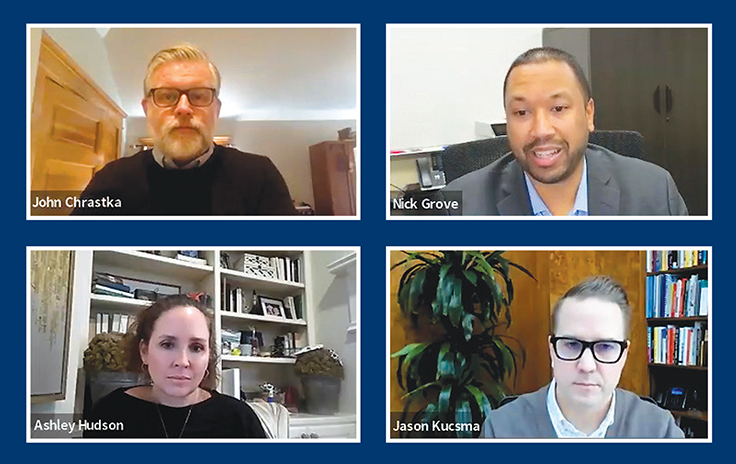
With Super Tuesday, March 5, the 2024 election season kicks into high gear. To help break down the relevant library issues in this election year, LJ convened a roundtable of experts including John Chrastka of EveryLibrary; Nick Grove of Meridian Library District, ID; Jason Kucsma of Toledo Lucas County Public Library, OH; and Representative Ashley Hudson from the Arkansas House of Representatives. They covered everything from voter engagement strategies for libraries on the ballot to book ban advocacy in challenging districts to engaging the electorate in an important presidential election year.
PARTICIPANTS |
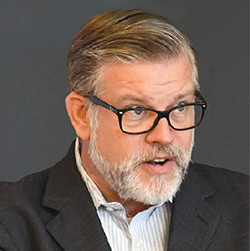 |
|
JOHN CHRASTKA | EXECUTIVE DIRECTOR, EVERYLIBRARY Chrastka and the EveryLibrary team help school, public, and academic libraries secure funding and policy wins through public awareness and advocacy. everylibrary.org |
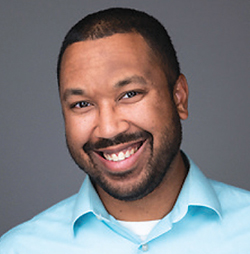 |
|
NICK GROVE | LIBRARY DIRECTOR, MERIDIAN LIBRARY DISTRICT, ID Grove became director of Meridian Library District in July 2022. He successfully led the library through a dissolution challenge over contested material in 2023 and will celebrate the District’s 100th anniversary this year. mld.org |
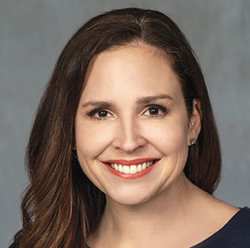 |
|
REPRESENTATIVE ASHLEY HUDSON | STATE REPRESENTATIVE, ARKANSAS HOUSE OF REPRESENTATIVES Rep. Hudson is currently serving her second term in the Arkansas State House, representing West Little Rock in District 75. She is a mother, attorney, and advocate for veterans and caregivers. ashleyforarkansas.com |
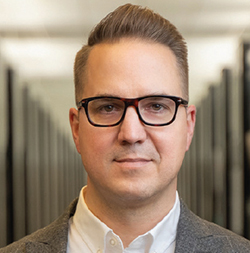 |
|
JASON KUCSMA | EXECUTIVE DIRECTOR/FISCAL OFFICER, TOLEDO LUCAS COUNTY PUBLIC LIBRARY, OH Since becoming executive director in 2019, Kucsma has navigated the expansion of library services and a successful 2022 operating levy, while earning TLCPL the 2023 IMLS National Medal for Museum and Library Service. toledolibrary.org |
LJ: Let’s start with the most polarizing and politicized topic for libraries over the past couple of years—book bans and censorship. Where do things stand in relation to these issues, and where are they going?
JOHN CHRASTKA In 2024, on either primary election days or in the November general election, there’s probably going to be somewhere around 220 to 240 public libraries on the ballot around the country. If 2023 was any indication of what’s going to happen, we’re going see a few of them facing election days that they don’t want. Perhaps they’re being forced to go to the ballot because of a petition like in Pella, Iowa, or they’re facing really strong and negative opposition over book bans and censorship like they did at the Patmos Library in Michigan.
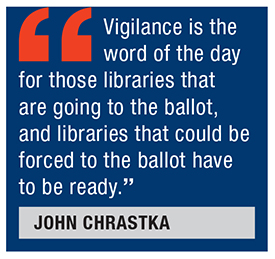 Those local library campaigns that are positive—renewals, folks going out for good ideas—I’m a little nervous for some of them, where unexpected pockets of problems can pop up. Vigilance is the word of the day for those libraries that are going to the ballot, and libraries that could be forced to the ballot have to be ready.
Those local library campaigns that are positive—renewals, folks going out for good ideas—I’m a little nervous for some of them, where unexpected pockets of problems can pop up. Vigilance is the word of the day for those libraries that are going to the ballot, and libraries that could be forced to the ballot have to be ready.
We’ve got a lot of different offices on the ballot in 2024, whether we’re talking about school board, city council, county government, state legislature, or congressional races, and I want to remind people that the future of libraries is really going to be written in the states.
We had 15 states last year that tried to criminalize librarianship through legislative activities, and the count in 2024 is already ramping up. Those state legislative races are vital for the state funding formula. Then, where there’s opportunity in states that have might have a clearer field, a little bit of a green zone, can we advance some good, pro-library bills?
Finally, there are local issues and school board races. In those school board races, how do we articulate our values about what it means to protect kids from discrimination, to protect kids’ right to read, and a family’s right to self-determination?
It’s up and down and around. It’s going to be a fun year for tracking.
Zooming in on the local level, Nick, your library system faced a petition for dissolution over contested material last year. How did you lead your organization through such a tumultuous period? And what did you find to be effective strategies as an advocate?
NICK GROVE It was an interesting time last year. We were going through the dissolution process in March of 2023, which was roughly eight months after I became library director. Luckily, I followed one of our industry’s biggest rock stars [Gretchen Caserotti], and the work that she and our board had done set us up to be well positioned to tackle the issue…so we had our policies locked in, and we had our board trained on the matter.
Over many years we’ve spent time getting deeply embedded in our community, especially at the business and local politics level. We call people, talk to them, and help them be advocates for us out in the community. We made sure that library usage and the value of libraries were not seen as a political divide issue.
We also hired a PR firm to help craft our messaging [on the issue], and we worked with our lawyers to make sure our policies were aligned. We tried to be as prepared and ready as possible.
Representative Hudson, you have been a vocal advocate for libraries in Arkansas, where they faced legislative challenges over materials. In deeply red areas where we tend to see more of these kinds of challenges and proposed legislation, how can libraries be the best advocates for their institutions, and who else do they need to bring into the fold?
REP. ASHLEY HUDSON Often what we have found here in Arkansas is that some of the most vocal opponents of free access to libraries haven’t been in one in a very long time. I don’t say that to degrade them for not going into a library, but to say that it is so much easier to demonize someone or an institution that is at arm’s length.
Invite both opponents and proponents into the libraries— invite them to a community event, invite them to meet with you. Don’t wait for them to show up with a group or to protest.
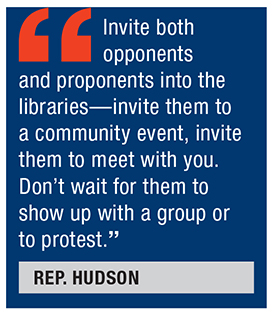 During the debate on SB 81, the book banning legislation here in Arkansas, one of my conservative colleagues got up and spoke in favor of libraries in part because she talked about how important her local library was to her community and how important it was to her kids when they were in school. She spoke about all of the good things that libraries do in the community, and she brought the debate away from all these big scary things that librarians and libraries have been accused of and back to what libraries are.
During the debate on SB 81, the book banning legislation here in Arkansas, one of my conservative colleagues got up and spoke in favor of libraries in part because she talked about how important her local library was to her community and how important it was to her kids when they were in school. She spoke about all of the good things that libraries do in the community, and she brought the debate away from all these big scary things that librarians and libraries have been accused of and back to what libraries are.
Reminding these opponents of who you are and what libraries are is vitally important; getting those allies in the business community, in the religious community, and the educational community, and getting them willing to speak in favor of the library—all of those things were so important in humanizing this debate.
How do libraries that are on the ballot this year or advocating for funding need to be thinking about how to engage their communities in this election year?
JOHN CHRASTKA The questions that we’re getting from libraries about going to the ballot this election year are fundamentally about whether the current climate around book bans and censorship is going to affect them directly. There are many reasons that libraries can lose a measure, and when you get right down to it, book bans and censorship and the attacks that are coming in from external sources—that’s only one of them.
We need to use this moment to gauge whether library communications have been effective, not just in encouraging [library] use, but in encouraging support. To encourage use is great…but on Election Day, do voters have a moral compass that’s pointing in the same direction as librarians? Have we activated them?
Each community is different, but, fundamentally, have librarians talked to non-users about what we do all day for a living?
JASON KUCSMA I’m pleased to say we passed our operating levy a few years ago with 72 percent support, which I think speaks to John’s point about talking to both library users and non-users.
In building that network of support, I echo what Nick and Rep. Hudson mentioned about engaging with the business community. We know that public libraries are a driver for economic growth and workforce development. And, at the same time, a lot of people don’t necessarily connect libraries with that.
I joke sometimes that as much as I love hearing people’s stories about their childhood library, I don’t want to hear them anymore. I want people talking about how their neighbor got a job because they were able to skill up using resources that a library provided.
As we’re considering a bond issue at my library this year, we’re thinking a lot about the importance of place. At a time when the Surgeon General has issued warnings around isolation and loneliness as a major public health crisis, I think about public libraries as one of the unique institutions that can help our communities come together and become stronger after years of physical isolation.
REP. HUDSON One of the things that I always think about when I’m working with my colleagues on a piece of legislation is to know my audience—and I think that’s key for libraries to remember.
I like to go to the library because my kids can check out books, and it’s a place where we can spend time together. But other visitors are going because they can use the internet and apply for jobs; other users are going because they have a knitting club that meets in one of the community rooms. All those constituencies are going to have different values, and they’re going to have different perceptions of the need that’s being served by the library.
So, it’s important for libraries with 2024 elections to think about crafting their messaging in a way that is tailored to specific groups, because it can’t be a universal blanket message. We’re in an era right now of hyper-individualism, and consequently, people expect you to be able to speak their language. Part of that is knowing what value the library has to certain groups of people and tailoring your message to those values and those individuals.
NICK GROVE I agree that we must know who we’re talking to and how to craft a message that works for them. Depending on if you’re talking to someone who will be a supporter at the voting booth or if you’re talking to a policymaker or someone who’s able to influence policymakers, it’s important for us to know our message.
It’s also important to recognize that you can’t win everybody over. Be cognizant of your time and your resources because trying to get 100 percent support is a fool’s errand.
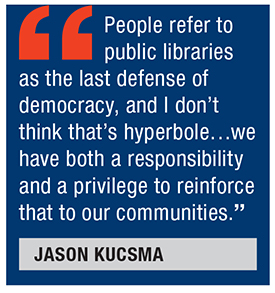 JOHN CHRASTKA We can segment markets in a lot of different ways, but we have to make sure that we’re not just talking to one group. Progressive language only resonates with a certain number of voters. Talk to Libertarians in this election cycle about unconstitutional censorship. We’ll cut through a lot of noise about taxes. Talk to traditional conservatives about book bans, because they’re hearing a tremendous amount about them.
JOHN CHRASTKA We can segment markets in a lot of different ways, but we have to make sure that we’re not just talking to one group. Progressive language only resonates with a certain number of voters. Talk to Libertarians in this election cycle about unconstitutional censorship. We’ll cut through a lot of noise about taxes. Talk to traditional conservatives about book bans, because they’re hearing a tremendous amount about them.
One of the things we’re doing at EveryLibrary this year is the Libraries 2024 campaign. It’s intended to talk to the American public at scale. I’d like to get a million people on our social media and talk to them about library-shaped solutions to problems and how that matters when they go to vote, whether it’s candidates or issues.
We’re not getting on the other end of this election cycle unless we build a much bigger tent—that’s what politics is all about.
We’ve talked a lot about libraries positioning for their own advocacy, but another big thread for this election year is how libraries will be supporting voters themselves.
JASON KUCSMA One of my goals when I became a library director was to dig into civic literacy and civic engagement. We know voting is down across the country. We typically see people engage when there’s a crisis or when there’s something problematic, but I think helping people exercise that muscle on a regular basis, that is something that we as a public library can really drive home with our communities. And, so, to that end, my library rolled out an online civic center.
We contracted with Ballot Ready, basically providing a portal for our community to go in to look at their ballots, to examine the issues, to understand who’s running. In addition to that information, it highlights which offices will be open so people can decide if they might be interested in running for office.
Like a lot of our other public library colleagues, our staff are deputy registrars, so we’re registering people to vote. Our staff wear buttons saying, “Ask me how to register to vote.” Doing a lot of that work has been critical, and reminding folks that we’re not here to push an agenda one way or the other. We’re here to advance the principles of democracy and people’s individual rights to access information and free speech.
People refer to public libraries as the last defense of democracy, and I don’t think that’s hyperbole. I think we are a very democratic institution, and we have both a responsibility and a privilege to reinforce that to our communities.
In these challenging times, what are your perspectives on the environment for librarians? How can we ensure we’re not losing good people?
NICK GROVE Going through everything that we went through last year, there was an online post from one of the leaders of the group against [Meridian Library District] that was threatening to send people to my house. That actually ended up galvanizing a lot of support for us because people saw that their rhetoric had really crossed the line.
Normally a library board meeting has very few people in attendance, but my very first board meeting [as director] had about 200 people show up. We had other large board meetings for the next eight months, and they were sometimes on the verge of being volatile. So we had a police presence to make sure that everybody was safe. And we welcomed people who very strongly disagreed with the library, supporting their First Amendment right as long as it didn’t cross the line of endangering other people and violating our code of conduct.
JASON KUCSMA Nick, you mentioned the expectations for behavior, and one of the things that we’ve noticed is that people’s patience is just a degree shorter than it used to be, and people are a little bit more volatile. So, we’ve been a little stricter about enforcing our expectations for behavior.… I think that helps staff understand that we do have a line on the ground that people cannot cross. We are in a civil society where we have to get along with each other regardless of whether or not we agree with each other.
How should libraries be thinking about this election year in terms of prioritizing resources and focus? What should be at the top of the list?
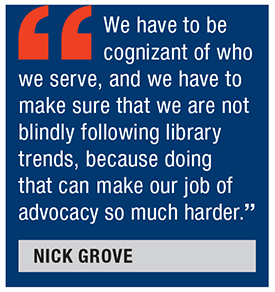 REP. HUDSON I know that people are looking at the 2024 election with a lot of trepidation, and I think that’s especially true in your industry because of what we’ve seen in the past couple of election cycles. But I think there are reasons to be a little bit hopeful, at least in certain areas.
REP. HUDSON I know that people are looking at the 2024 election with a lot of trepidation, and I think that’s especially true in your industry because of what we’ve seen in the past couple of election cycles. But I think there are reasons to be a little bit hopeful, at least in certain areas.
I recognize that different parts of the country are experiencing these book ban cycles at different times, but one of the things that I’ve noticed since these anti-library campaigns really picked up is that the average person who maybe doesn’t get involved in politics is paying attention now.… Reach out to those people and bring them back into the libraries. Make sure that you’re encouraging those conversations with people who “don’t do politics” but who can be good allies in the community.
JASON KUCSMA Recognizing that some of our institutions have been around for hundreds of years gives me perspective. We’re not the first generation to have to deal with this kind of stuff in the public library, and we’ve lasted through it in different times in our histories.
There’s a reason we’ve been around for as long as we have, and there’s work that we can do to preserve and honor that tradition while we’re still innovative and forward-thinking institutions.
NICK GROVE This year the Meridian Library District is celebrating 100 years of public library service to our community. It’s important to be doing all the things that we’ve been talking about, but it’s equally important, if not more so, that we are responsive to our community and our community’s needs. What works for New York Public Library might not work in Jason’s library; what works in Ashley’s library district might not work in a town of 400 people in rural Idaho.
We have to be cognizant of who we serve, and we have to make sure that we are not blindly following library trends, because doing that can make our job of advocacy so much harder.
The more outreach, the more services we provide, the more networking that we do out in our community—the easier it is for us to go forward on some of these ballot initiatives or legislative policy issues.
The conversation has been edited for length and clarity.
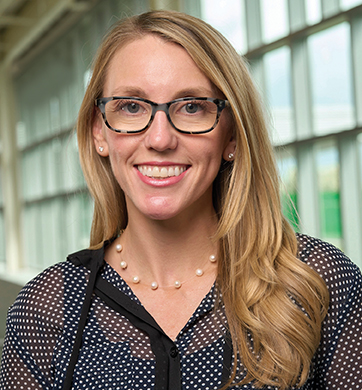
Add Comment :-
RELATED
ALREADY A SUBSCRIBER? LOG IN
We are currently offering this content for free. Sign up now to activate your personal profile, where you can save articles for future viewing








